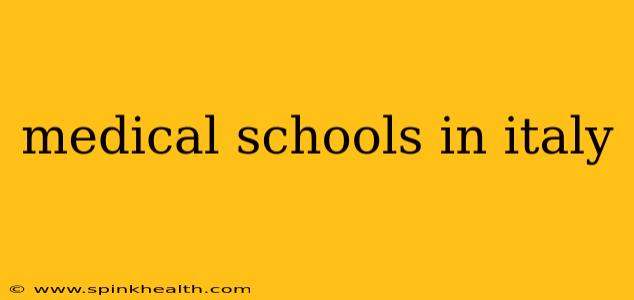The romantic cobblestone streets, the captivating art, the delicious cuisine – Italy offers so much more than just breathtaking scenery. For aspiring physicians, it also boasts a rich history of medical innovation and a network of esteemed medical schools. But choosing the right one can feel overwhelming. This guide will help you navigate the intricacies of applying to medical schools in Italy, answering your burning questions along the way.
What are the best medical schools in Italy?
This isn't a simple question with a simple answer! "Best" is subjective and depends on your specific goals and preferences. However, consistently high-ranking and respected institutions include:
- University of Milan: Known for its strong research focus and diverse specializations. Its long-standing reputation draws students from around the globe.
- University of Padua: One of the world's oldest universities, boasting a rich history and a strong tradition of medical excellence. Expect rigorous academics and a deep-rooted academic culture.
- University of Rome "Sapienza": As one of the largest universities in Europe, Sapienza offers a broad range of medical programs and significant research opportunities. The sheer scale provides numerous networking possibilities.
- University of Bologna: Another historically significant university, Bologna offers a well-regarded medical program steeped in tradition and academic rigor.
- University of Florence: Renowned for its strengths in specific medical fields, such as cardiology and oncology, Florence offers specialized learning and research opportunities.
These are just a few examples; many other excellent medical schools exist throughout Italy. Researching specific programs within these and other universities is crucial for finding the perfect fit.
How difficult is it to get into medical school in Italy?
Getting into medical school in Italy is highly competitive. Admission processes vary slightly by university, but generally involve:
- High School Diploma: A strong academic record in high school is essential. Excellent grades in science and math are particularly important.
- Entrance Exam (Test di accesso): Most Italian medical schools require a challenging entrance exam assessing knowledge in biology, chemistry, physics, and logic. Preparation is key.
- Language Proficiency: While lectures may be in Italian, some programs offer instruction in English. However, a strong command of Italian is usually beneficial, especially for clinical rotations.
The acceptance rate varies each year, but expect a highly selective process requiring dedicated preparation and strong academic credentials.
What is the language of instruction in Italian medical schools?
Most Italian medical schools conduct their courses primarily in Italian. While some universities may offer specific programs or parts of programs in English, particularly at the postgraduate level, the majority of the instruction will be in Italian. A strong command of the Italian language is crucial for successful completion of the program.
How long does it take to become a doctor in Italy?
The medical degree program in Italy typically takes six years to complete, followed by specialized residency programs (further training in a chosen medical specialty) that last from three to five years depending on the chosen specialty. This makes the total time spent in training to become a fully qualified specialist considerably longer than the initial six years of medical school.
What are the admission requirements for medical school in Italy?
As mentioned before, the requirements differ slightly depending on the university but generally include:
- High School Diploma (Diploma di Maturità): A high school diploma is the fundamental prerequisite for application.
- Entrance Exam: A highly competitive entrance examination is the main hurdle. These tests often comprise multiple-choice questions assessing scientific knowledge and reasoning skills.
- Language Proficiency (in Italian): While some postgraduate programs might be offered in English, a solid understanding of Italian is vital for success in the core medical degree.
Thoroughly researching the specific requirements of your target medical school is paramount.
What are the career prospects after graduating from a medical school in Italy?
Graduates from Italian medical schools have diverse career paths available to them, both within Italy and internationally. Opportunities exist in various sectors:
- Clinical Practice: Working as a physician in hospitals, clinics, or private practice.
- Research: Pursuing research careers in universities or research institutions.
- Public Health: Working in public health organizations or government roles.
- Teaching: Becoming a medical educator in universities or teaching hospitals.
- International Opportunities: Many Italian-trained doctors seek opportunities abroad.
The career path and opportunities will heavily depend on specialization chosen after completing medical school.
The journey to becoming a doctor in Italy is challenging but rewarding. With careful planning, diligent preparation, and a passion for medicine, your dream of practicing medicine in the heart of Italy can become a reality. Remember to thoroughly research your chosen university and prepare effectively for the rigorous admission process. In bocca al lupo! (Good luck!)

